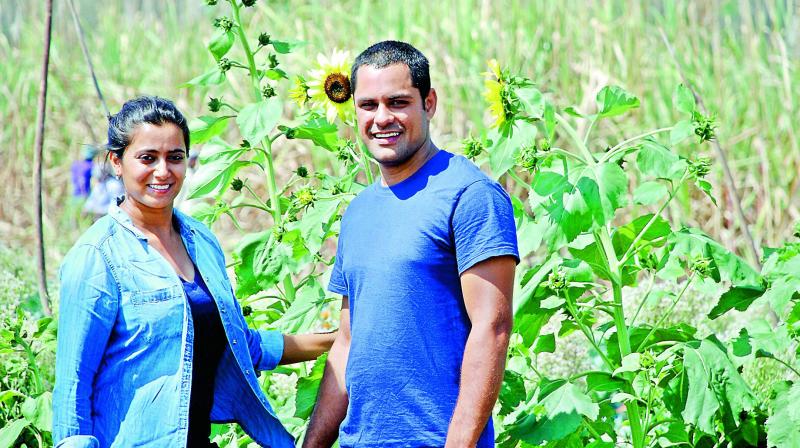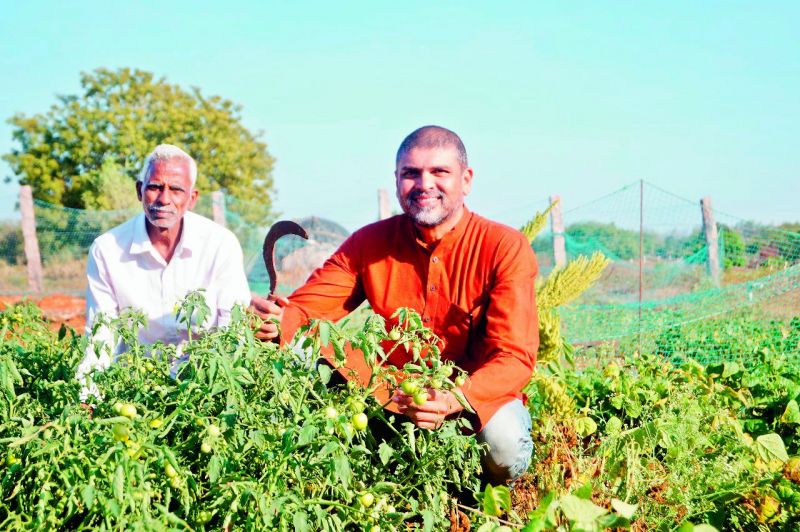Eat organic, live well
Organic farming has been practised since ancient times, but now, both celebrities and the common folks are taking to it in a big way.

From Kangana Ranaut, who has been growing organic produce in her farm in Manali to Sushant Singh Rajput, who has bought land on the outskirts of Mumbai for organic farming, many celebrities have adopted this healthy lifestyle. Dia Mirza too, has taken the urban route by growing vegetables and fruits in her own balcony.
Recently, the Women of India Organic Festival, organised in Hyderabad by the Women and Child Development Ministry, brought into focus a few traditional methods used for farming, which are once again coming back to the forefront. Kalpana Ramesh, Co-Founder, KAAVA Design Studio and Water Crusader, who started growing her own organic produce, says, “Trends keep changing but growing organic is our tradition. It should become a lifestyle to avoid ill health. Because of contaminated food, we are heading towards disaster. Organic farming is not about only ‘farming without chemicals’ but also about the environment, agricultural traditions, traditional seeds, animal welfare, farming communities, sensible energy use, soil and water conservation.”
Kalpana’s terrace garden boasts of potatoes, tomatoes, radish, carrots and gourds to basil, green leafy vegetables, ginger, lemon grass and grapes. Using recycled water for her garden and bio-degradable plant containers, she says that she started her own terrace garden because she wanted her whole family to eat healthy food.
Food is not just about taste, it is also about nutrition, safety and biodiversity. “We need to take care of the soil and the air for us to have quality food on our table.”
Organic and naturally grown vegetables are proven to have more nutrients. Chemical pesticides that are used in conventional farming are damaging our health,” says Sridevi Jasti, celebrity nutritionist and founder of Vibrant Living, which provides tasty, healthy, organic and gourmet foods.
 Mujtaba Askari (on the right) with an employee in his farm
Mujtaba Askari (on the right) with an employee in his farm
Explaining the need to connect the food we eat to the ecosystem where it grows and people who depend on it for livelihood, Sridevi, who is an advocate of healthy living, says, “Traditional eating stands really strong in India. As Indians, we strongly connect with food and our flavours and cuisines satiate us the most. Sadly, too much junk food has come into the market, which is addictive and unhealthy. Our people are falling for them for convenience and ignorance.”
The habits and lifestyles of our grandparents are slowly being forgotten. Sridevi explains, “The biggest obstacle for Indians to return to traditional ways of eating is that we are not cooking at home. We have got used to fast and easy food, also good ingredients are not easy to find. They might not even be affordable. We are forgetting our traditional recipes, compounded by a lack of interest in foods that heal, and a lack of understanding about their value.”
Anjali advises, “There is too much information being shared and thrown at each other on social media. Don’t read too much news, watch all the advertisements, and follow too many conflicting theories and research about health and food. Let your intelligence do the work. If you focus on yourself, you will know what works for you, what nourishes your body and how to live a healthy life.”
Avoid supermarket foods
So have traditional foods and cuisines totally been sidetracked by the newer and faster options available?
“The plethora of trendy diets, supermarket foods and Western trends have made the food scene pretty bleak over a period of time. Consequently, the pharmaceutical, medical and acidity/flatulence controlling industries are flourishing. But people are once again starting to realise the value and nutritional density of traditional foods. Thanks to people like nutritionist Rujuta Diwekar, the newer generations are transforming into healthier beings who realise the value of traditional foods. In India, we are still holding on to our roots, and I really hope it'’s not too late,” says Anjali Rudraraju, who along with husband Kabir Cariappa, has created their own little organic haven called Yarroway Farm in Karnataka.
Interestingly, while we don’t mind spending money on preventable medical expenses, often times, we tighten our purses when it comes to organic food which is seemingly a bit expensive.
“The tradition of cultivating, harvesting and consuming organic and whole food has degenerated. It is a systemic collapse of the entire food system. Traditional food systems require appreciation, patience and a mindset for organic and wholesome foods, which is missing in today’s world,” says Mujtaba Askari, founder of Helping Hands. He and his brothers bid adieu to city life and settled in Murtuzaguda village near Moinabad, where they produce their own vegetables, rear hens for meat and eggs and get milk from a cow in their backyard.
“Given the present day situation, organic food will remain only a trend and not a tradition or way of life unless there is a change in the mindset of people across all sections. We tend to think organic only when there are festivals or road shows, but one needs to believe that a traditional system can be beneficial for us and our future generations,” says Mujtaba.
A way of life
The word “organic” is used widely and in varied contexts these days. Organic was initially related to just food, assumed to be produced without the use of any chemical inputs. “In a country like India, such a way of living means going back to our roots. More and more people are getting curious about our ways of living from two to four generations ago — be it the kind of food we consumed (e.g. millet based foods), the way we cooked (e.g. traditional cookware vs. non-stick utensils), or the way we clothed for our weather conditions (e.g. breathing handloom cotton made by weavers using non-GMO cotton, which ruins the earth),” says Narayan K. Murthy, co founder of Goodseeds, which is promoting the idea of healthy living and a safe environment for generations to come.
However, he believes that we are at a nascent stage and just scratching the surface of such positive trends.

